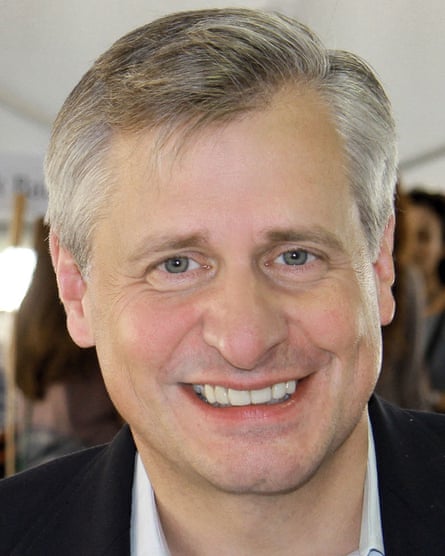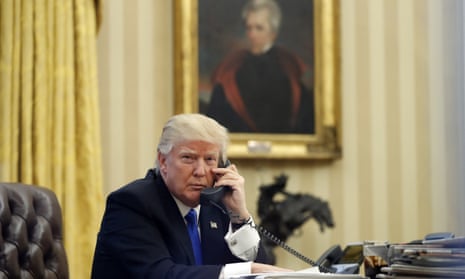The Hitchhiker’s Guide to the Galaxy had two giant words on the front, imparting unimprovable advice: “Don’t panic.” Jon Meacham’s new book, a sort of hitchhiker’s guide to the American soul, could easily bear the same cover legend for anyone in a state of perpetual alarm about Donald Trump.
The historian isn’t suggesting we can all let our guard down. But with the perspective of centuries rather than the frenzied 24-hour news cycle, he does make a persuasive case that the present crisis is not unique – or, to put it another way, that there were plenty of causes for panic in the past yet, so long as attention was paid and citizens stepped up, the republic endured.
“My fear with this book was that people were going to say, ‘Oh, he’s saying relax, everything’s going to be fine,’” Meacham told the Guardian. “It’s quite the opposite. It’s: ‘Get to work and everything might be.’”
The Pulitzer prize winner’s book is called The Soul of America: The Battle for Our Better Angels. He expounds: “It’s natural to think that your own moment is ‘the most this’ or ‘the most that’. It’s the tyranny of hyperbole and the narcissism of the present – which is a phrase I didn’t put in the book but which I now love – and it’s understandable. I mean, nostalgia is a powerful drug.
“It doesn’t mean that the present isn’t vital but my view here is, before you decide to set your hair on fire after a given tweet, just take a moment and think: is this really worth a disproportionate view? Is panic a proportional response to Donald Trump? It may be, but I’d like people to read this book and then perhaps at least decide whether or not they want to hit the ‘panic’ button as opposed to the ‘concerned’ button.”
Trump’s anarchic, vulgar, fear-mongering and norm-busting style is lapped up by supporters but poses a dilemma for critics. The Women’s March on his first full day in the White House was a resounding clarion call and the liberal billionaire Tom Steyer is agitating for impeachment. But is it paralysing to remain in crisis mode for four years? Conversely, does an attempt to shrug off the madness and get on with everyday life risk normalising the abnormal? Samuel Beckett’s Waiting for Godot includes the line: “The tears of the world are a constant quantity. For each one who begins to weep, somewhere else another stops.” Can the same be said of anti-Trump outrage?
From immigration to climate change to the Iran nuclear deal, there is plenty to be outraged about, as MSNBC’s The Rachel Maddow Show and the former Hillary Clinton aide turned tweeter Philippe Reines constantly remind us. Yet the president’s bark has proved worse than his bite on curtailing press freedom (at least so far) or firing the special counsel Robert Mueller (at least so far) and he has not fulfilled the worst prophecy of doom. Unlike George W Bush, he has not started a war (at least so far).
Are some of the most hysterical anti-Trumpers going too far?
Meacham is measured: “Sure, and some people aren’t going far enough. I think his reflexive opponents are endowing him with superpowers that he doesn’t possess. But his Fox News base believe him to be a messianic figure, a view for which there is virtually no evidence. So what I worry most about is this tribal divide that is reflexive as opposed to reflective and my goal here is: I don’t think we’re being true to the origins of the country if we dismiss reason and proportion on both sides.”
Meacham believes that partisan media, while not the cause of the trend, have exacerbated it. “I think from what I have seen of the opinion programming in the pro-Trump cable world, it’s pretty amazing. It’s just an alternative universe and it’s possible that the anti-Trump people will go too far that way. On a human level, it’s all understandable. If you’re prepared to be outraged every day, Donald Trump will outrage you. If you’re prepared every day to defend him, you’ll have that impulse, so it’s not particularly illuminating.”
Meacham’s elegantly written book makes clear that we have been here before, one way or another. Fear, strife, division and uneven progress have been the norm, not the exception, of American history. The lurch from Barack Obama, the country’s first black president, to Trump, endorsed by the Ku Klux Klan, should not come as a surprise considering the backlash against immigrants in the first world war, the resurgence of the Klan in the 1920s or Senator Joseph McCarthy’s anti-communist witch-hunts in the 1950s. For Meacham, the “better angels of our nature” prevail in presidents who unify, people who mobilise and institutions that weather the storm.
“In our system we have about five forces that are in the arena at any given time: the presidency, the Congress, the courts, the press and the people,” he says. “As long as two or three of those are in the right place or pushing in the right direction, I think we think we’re going to be OK. Right now, I think we have about half of that force pushing in the right direction.

“This is a stress test for citizenship, and that can sound sentimental, but it actually has the virtue of being true because the story of our country is that the more generously we’ve interpreted the Jeffersonian assertion of equality, the stronger we become.”
‘Demography is destiny’
The ascent of Trump could make even the most Pollyanna-ish American feel bleak about the state of race relations. He has assembled a cabinet dominated by middle-aged white men. He introduced a travel ban on some Muslim-majority countries, denigrated Native Americans and campaigned for Roy Moore, an Alabama Senate candidate who spoke positively about slavery. When white supremacists marched with flaming torches in Charlottesville, Virginia, and violence erupted, Trump said there was blame on “both sides”.
But again, Meacham, from Tennessee, offers reassuring perspective, though not complacency. “Fifty years ago in my native region, we had a functional apartheid, so as a relative matter, things are vastly better. But that’s a white man saying that, so take it for what it’s worth. It is a perennial issue. I think it always will be.
“Things are better today than they were yesterday but history does teach us that things can fall apart and slide backwards if we’re not incredibly attentive and devoted to that idea of fair play for everybody. My argument is the best way to guarantee fair play for yourself is to give it to others.”
Trump’s bleak and bilious inaugural address promised: “From this moment on, it’s going to be America first.” In March, he pushed ahead with tariffs on steel and aluminium imports, threatening a trade war with China and Europe. Diplomatically, critics say, the US is abandoning its leadership role when it is urgently needed.
Meacham reflects: “This is an incredibly important moment in the globalisation of the world and it would be great if we had a president like Ronald Reagan, like George HW Bush, like Bill Clinton, like George W Bush, who understood the importance of free trade, who understood that that we’re stronger the more open we are. This is an unfortunate period of reaction. My own view is that the ferocity of the reaction is really a validation of the broader trend.
“This is not a partisan point but I would bet a lot of money that in 2038 – the same amount of time that separates us from the last years of Clinton, which is [kind] of amazing – America is going to look a lot more like Barack Obama’s America than Donald Trump’s America. Demography is destiny here. We will have these backlashes – this is not the last one – but you can’t argue with broad historical forces, and the broad historical forces are pushing toward a more pluralistic, more open world.”
If there is consolation to be found in the past, the 1860s (civil war) and the 1960s (division over the Vietnam war) are most frequently trotted out as the readiest comparisons to today. Meacham resists the former – “it’s just such an outlier” – but does find resonance in the latter, although he notes: “Fifty years ago, if we had been talking on this date in 1968, an average of 46 Americans died in south-east Asia in combat. Forty-six a day! It’s incredible. Can you imagine that today?”
Another Washington parlour game is seeking analogues for Trump in past presidents: the demagoguery and racism of Andrew Jackson, the corruption and mendacity of Richard Nixon, the celebrity and media savvy of Ronald Reagan. Yet the 45th president is by definition sui generis in the sense that he is the first never to have served in government or the military. For once, the term unprecedented is justified.
“There are elements of Trump that have precursors but he is in fact unique in the compound that he offers,” reflects Meacham, biographer of Thomas Jefferson and the first Bush. “I think it’s hard to imagine – though we never rule this out – it recurring in exactly this way. But my broader point is we’ve survived presidents who were not commensurate with the task and I think we’ll survive this one.
“But [it takes] the paying of attention, the voting. The reason Hillary is not president is because the Obama turnout was not there for her in critical states. It was a perfect storm that elected [Trump] and again, hard to imagine those elements ever coalescing again. But I didn’t think Donald Trump was going to be president, so what the hell do I know?”
The author recently delivered a touching eulogy at the funeral of the former first lady Barbara Bush, which Trump did not attend. He saw George HW Bush again last week. Can Meacham foresee the post-Trump Republican party producing a leader in the Bush mould?
“I can, because I think what the Republicans have proven is that fundamentally they are a malleable bunch and the right apostle can teach them a new creed pretty quickly. To have gone from a free-trading, Burkean party to a populist rightwing party in a single cycle suggests that it’s a plane that can be hijacked pretty easily.”
At 93, Bush himself remains a perennial optimist in the experiment of self-government. When it comes to navigating life, the universe and everything, “don’t panic” is good advice. But in Trump’s America, don’t relax, either.
